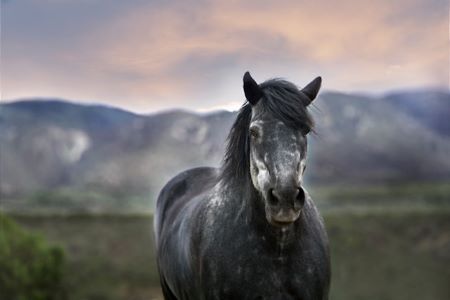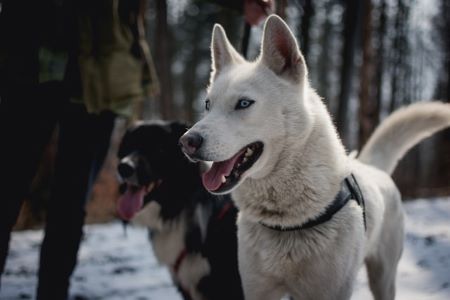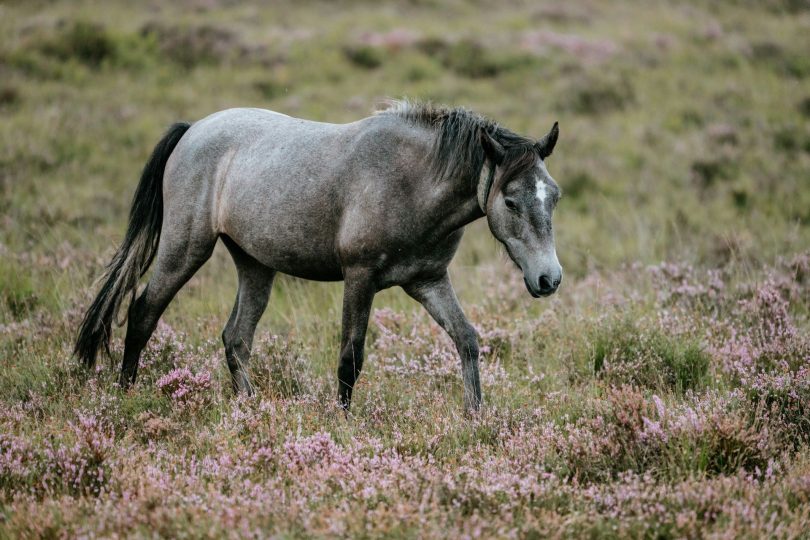The reason I decided to train in Animal Aromatherapy, many moons ago, was because of the dramatic results I saw when offering essential oils to a horse I was working with. This horse was scared of everything and lived in a constant state of agitation. I offered him chamomile to smell and witnessed him move from terrified to trusting in the course of one session. I was hooked.

I have always had a special interest in animal behaviour and helping animals adapt happily to domestication. Essential oils make my work much easier. However, it’s still important that we understand the root cause of problematic behaviours—for both the animal and the humans who care for them. That root cause is stress.
In any domestic situation, there is a certain level of stress because animals live in a way that suits humans, rather than their own species-specific physiological and psychological needs. Horses were not designed to live in stables, isolated from herd members with restricted access to food. Dogs were not designed to be left alone for hours on end without pack members. Nor are they well-adapted to the chaotic nature of human relationships. This can lead to behaviours that are not in anyone’s best interest, such as aggression.
We can help our animals adapt to common domestic stressors by better understanding what stresses an animal, what stress looks like, and how we can reduce it.
There are many simple adjustments we can make to how we care for our four-legged family members, helping them enjoy life more fully.
Helping people understand stress and how to relieve it is a founding principle of the Animal PsychAromatica animal wellness system, because stress is also the root cause of most illnesses. When we alleviate stress, we automatically increase health.
The Role of Essential Oils in Reducing Stress
Alongside adjustments in lifestyle and diet, offering essential oils for self-selection is one of the easiest and quickest ways to reduce stress. Studies on humans show that a lack of choice—such as in a prison environment—is one of the major causes of stress. The same is true for our animals. Out of love and care for them, we often restrict their choices. They commonly cannot choose when or what to eat, when to exercise, or who to associate with.
By offering them essential oils or herbs to self-select, we return this element of choice. I love the look on an animal’s face when it is first offered an essential oil. It seems to say, “Really? You mean it? I can choose?” This instantly builds trust with me. Moreover, essential oils interact directly with the body, lowering heart rates or relaxing the nervous system. The resulting healing is immediate and profound.
A Case Study: Casper
Background
Casper is a 2-year-old husky mix with fearful aggression, barking at strangers, confidence issues, hormonal imbalances, and security concerns. Born to a semi-feral mother in a Canadian rescue centre, Casper was removed from his mother and littermates very young. He retains a feral wariness, likely inherited from his parents.

Casper now lives in a wonderful new home, but he struggles with stress and fear-induced aggression, particularly towards strangers. The household includes other animals—dogs, cats, and farm animals—which makes adaptation challenging.
Lifestyle Adjustments
- Respect Casper’s space and sensitivity, allowing him to acclimatise to his surroundings naturally.
- Provide comfort and security with guidance and training to build confidence.
- Limit interaction with strangers until training is complete. Strangers should avoid direct eye contact and give him space.
Nutrition Suggestions
- A raw food diet, or if not possible, a high-quality gluten-free kibble.
- Include meaty bones, fresh water, and natural health treatments.
- Use essential oils, hydrosols, and consult a holistic vet for behavioural and health issues.
Oil Recommendations for Casper
Base Carrier Oil:
- Grapeseed (Metal): Ideal for behavioural and emotional issues.
Essential Oils:
- Jasmine (Fire/Water): Balances male hormones, calms nervous anxiety, and boosts confidence.
- Yarrow (Wood/Metal/Water): Aids past trauma, fearful anger, and emotional recovery.
- Valerian (Water): Addresses chronic fear, hysteria, and insecurity; acts as a sedative.
- Neroli (Fire): Soothes separation anxiety, nervousness, and emotional distress.
Casper’s Selection:
- Jasmine (Jasminum sambac)
- Neroli (Citrus aurantium var. amara)
- Valerian (Valeriana officinalis)
Dosage:
- Base oil: Grapeseed oil.
- Dilution: 1% (3 drops of essential oil per 10ml carrier oil).
- Administered twice daily for 14 days.
Results
During the treatment, Casper showed keen interest in the oils. Over time, his preferences evolved, and by the end of the 14 days, he was calmer, less aggressive, and barked significantly less. His owner noted improved interactions with visitors and other animals in the household.

Casper is now thriving in a dog training programme, adapting well to new people, dogs, and environments.
Conclusion
This case study demonstrates the profound impact of essential oils on animal well-being. By reducing stress and providing choice, we can transform behaviours and improve quality of life—for both the animals and their owners.
If you would like to learn how to use essential oils for animal well-being, check out our Animal PsychAromatica courses.
Main – Photo by Annie Spratt on Unsplash



